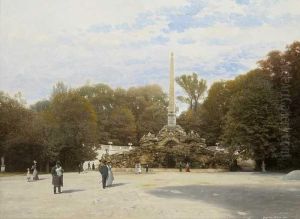Josef Lowy Paintings
Josef Löwy was an Austrian photographer renowned for his pioneering contributions to photography during the 19th century. Born in 1834 in Laibach, which is now Ljubljana in Slovenia, Löwy was a prominent figure in the Viennese art scene from the mid-19th century until his death in 1902. His career in photography began after a period of engagement with painting, a transition that mirrored the broader artistic move towards the new medium of photography during that era.
Löwy's work spans a variety of genres, including portraiture, landscape, and architectural photography. He was particularly noted for his architectural shots, which not only served as documentation but also as a form of artistic expression, capturing the aesthetic and structural nuances of buildings and urban landscapes. His photographs of Vienna are among his most celebrated works, providing a historical snapshot of the city's architectural evolution during the late 19th century.
Aside from his artistic contributions, Josef Löwy was also a significant figure in the professionalization of photography. He was a founding member of the Photographische Gesellschaft in Wien (Photographic Society of Vienna) established in 1861, which was one of the first photographic societies in the world. Through this organization and his own studio, Löwy played a crucial role in advancing photographic techniques and education, mentoring a generation of photographers and elevating the status of photography as a respected art form.
Löwy's legacy is preserved through his photographs, which continue to be exhibited and studied for their artistic and historical value. His dedication to the craft of photography and his role in its development during a pivotal time in its history cement his place as a key figure in the history of photography.
